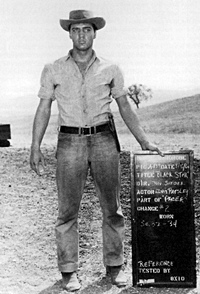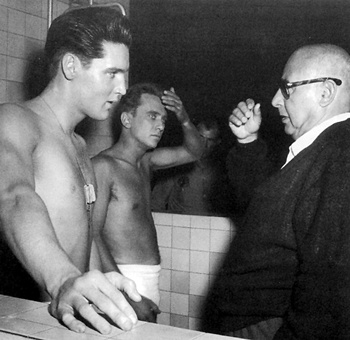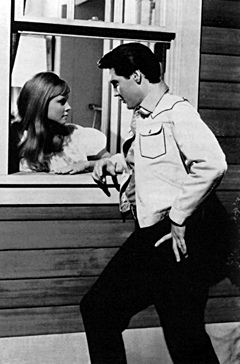 |
 |

Elvis Films FAQ by author by Paul Simpson ('Elvis The Rough Guide') is a 400-page marvellously entertaining look at Elvis’ movie career and with a very engaging agenda covering all aspects of this important part of his legacy. The first few chapters examine each film individually and are nicely grouped into four distinctive periods. There is a general overview of the chosen time frame and then a detailed look at each film. Loving Who?: - Love Me Tender to King Creole These key chapters take up the first 130 pages of the book. While there is, of course, a real fascination as Elvis’ early film career develops how Simpson found enough enthusiasm to write in detail about Elvis’ awful mid-to-late 60s movies is pretty impressive. He even finds some positives about the dreadful ‘Double Trouble’ and ‘Easy Come, Easy Go’! The real enjoyment of this book is the deep exploration of all facets of Elvis’ movie career. Simpson really does seem to try and cover most reader’s questions in the extensive 65 chapters examining everything from ‘Did Col Parker really provide any Technical Advise’ to ‘What do You do When You’re Asked to Write A Song Called ‘A Dog’s Life’. In the book Simpson not only looks for blame in Elvis’ terrible mid-sixties period movies – and it is certainly not all of Colonel Parker’s fault - but also examines the reasons for the triumphs of Elvis’ best movies. The book is honest, very detailed, and extremely well researched and best of all a very enjoyable read. The book also features a nice selection of photos to illustrate the narrative. Simpson also looks at Elvis’ soundtrack music in depth and discusses whether the importance of it in Elvis’ movies was good or bad – and amusingly also looks at some of the crazy aspects of it. Some of the more off-beat & interesting themes that Simpson explores are… (Please see our special extract link below - 'Big Boss Man: What Kind of Technical Advice Did Parker Provide for Elvis’s Movies?')
Perhaps the real triumph of this book was that it actually makes me want to revisit these Elvis films that I’ve seen too many times already – yes, even the dreadful ones like Double Trouble. Some fascinating new trivia is revealed along the way. Also how future movie projects have been influenced by Elvis’ films. It is also interesting to see how varied the reviews of the time were towards Elvis movies with even some of the most successful movies like ‘Jailhouse Rock’ receiving dreadful reviews. Similarly some of Elvis’ worst films received some surprisingly OK comments in the media. Another positive of this new book is that Simpson adjusts Elvis’ movies earnings and budgets to compare to today’s figures which really helps one understand the relevance of Elvis’ films in the marketplace at the time. The book also provides some interesting insights into the movies and how they fitted into Elvis’ own personal journey. For instance about 'Wild in the Country' Simpson discerningly writes...
Simpson’s writing is often humorous and found myself laughing out loud at times. The book is a very enjoyable read unlike some other investigative essays which can seem a little dry and factual at times.
Some key directors or actors such as Elvis create a genre of movie all of their own, for instance the ‘Gidget/Beach Party" genre or more seriously a "Tarantino" movie. In the chapter about whether Elvis movies were autobiographical Simpson fascinatingly compares the genres of the John Wayne movie vs Elvis Presley movie. In the end we Elvis fans too often forget how Elvis’ films had to fit into the "Hollywood System" which had been producing studio musicals since 1927 and The Jazz Singer. Elvis was hardly likely to feature in ‘Midnight Cowboy’ when the early sixties movie musicals were generally lightweight fluff which basically stiffled his whole film career. In the book Simpson has a detailed look comparing Elvis’ films to the other stereotypical types of movies from the time such as the fifties Crooners to the early post-war Teen Movies and sixties Beach Movies.
Elvis in G.I. Blues talking with director Norman Taurog
Simpson also investigates Elvis’ directors (good and bad), script writers, the co-stars and everyone you can imagine who has been involved with Elvis’ films. Norman Taurog (above) directed nine Elvis movies. By the time he directed 'Live A Little Love A Little' he was nearly blind! But as Simpson notes, if you want to see what an Elvis film might be like without Norman Taurog's involvement then check out Paradise, Hawaiian Style! Finally there is over 75 pages dedicated to a very detailed look at Elvis’ film music, the great over-looked songs, the dreadful songs and how the soundtrack albums were both good and bad for his career. The book also check how Elvis’ music features in more recent films. One of the classics is of course the Promised Land quote from 'Men in Black'....
And how could I have missed "Summer Kisses, Winter Tears" by Julie Cruise in Wim Wender’s crazy road-movie ‘Until the End of the World’ (1991)?
For some reason Gladys’ death is noted wrong on page 30 stating that she died March 24 1958. This was of course the date Elvis went into the army & Gladys had to say her sad good-byes. However this does look like an editorial mistake as there is no mention of the draft board experience and on page 5 the book states that Gladys died August 14, 1958. Unfortunately the book doesn’t state the dates when Elvis’ movies were actually filmed instead noting only their release date. This might mislead the reader into believing that ‘Viva Las Vegas’ was filmed after the dreadful ‘Kissin’ Cousins’. This is important as the low budget for ‘Kissin’ Cousins’ was due to the overspending on the earlier filmed ‘Viva Las Vegas’ which unfortunately was released afterwards. Another Elvis film oddity is that ‘Hard-Headed Woman’ released as the hit single was basically cut from the film ‘King Creole’ and only plays for a few seconds on-screen. This is another odd mystery not mentioned in this book. These are however minor quibbles in such a large book that covers all bases. In the end ‘Elvis Films FAQ’ is a marvellous examination of our hero as he created one successful movie after another and with perfect timing finally escaping his movie contracts at the right point. Director Cameron Crowe neatly explains the appeal of the Elvis Film... , "Elvis' catalogue of 31 movies is never less than fascinating, even when he was banging out three a year and barely keeping track of which girl, animal, car, co-star, or guitar he was performing with. Either a performer has built-in screen presence or he doesn't. Most don't. Elvis did, every time he stepped in front of the big glowing camera." Overall verdict: ‘Elvis Films FAQ’ is one of the most enjoyable books I have read this year. If you are interested in Elvis’ film career, as well as wanting to learn some new and fun trivia, then this is the book for you. Paul Simpson has examined every angle of Elvis’ film career and writes about it in a very engaging and enjoyable style. The real triumph of this book is that it will make you want to watch all of Elvis’ films one more time! Highly recommended.
Review by Piers Beagley. Click here to comment on this review
EIN Website content © Copyright the Elvis Information Network.
Elvis Presley, Elvis and Graceland are trademarks of Elvis Presley Enterprises. The Elvis Information Network has been running since 1986 and is an EPE officially recognised Elvis fan club.
|
|







